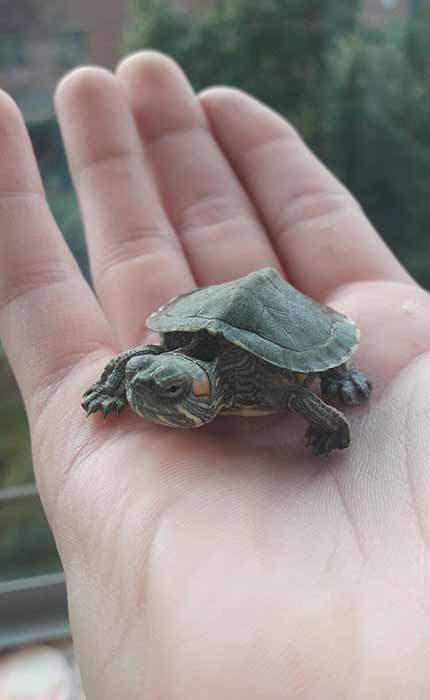Sometimes the law is formulated in a way that makes it a little hard to understand, and this also happens with laws about owning turtles and selling turtles as well. In this article, I am going to tell you in plain English what are the laws about turtles in Missouri.
Before diving into the exact laws let me answer a couple of the most asked questions.
Is it illegal to own turtles in Missouri? No, you can legally own a turtle in Missouri, it all depends on the species. There are certain endangered species that are protected by the law that are illegal to own, but most of the common ones are not endangered and you can own them as pets.
Is it illegal to sell turtles in Missouri? You can legally sell turtles in Missouri only if you have a license or a permit. If you don’t own one it is illegal and punishable by the law.
When it comes to laws on broad topics you can’t always get the right answer by simply answering with a yes or a no, so let’s take a closer look at what the laws have to say.
Laws regarding turtles are very different from state to state, while every state agrees on some aspects, like the fact that owning endangered turtles is illegal, a lot of states have a lot of laws regarding native turtles, but very few about non-native turtles, and as a result, things can get a little complicated if you don’t understand them properly. So let’s take a closer look at the laws of Missouri and see what they have to say.
Every state has very specific laws regarding turtles, especially for turtle species that are native to the area, sometimes those laws are specific to only one state and won’t apply to other states. So let’s take a closer look at the exact laws of Missouri about turtles.
Note: The term “turtle” includes all animals commonly known as turtles, tortoises, and terrapins.
Turtle Ownership Laws in Missouri
It is illegal to own any of the following turtle species:
- Western Chicken turtle
- Blanding’s turtle
- Illinois Mud turtle
- Yellow Mud turtle
You cannot own more than 5 turtles at a time without a permit. If you want to own more than 5 turtles you will need a Class I Wildlife Breeder permit.
It’s illegal to own any of the seven sea turtle species: Loggerhead turtles, Green sea turtles, Leatherback turtles, Hawksbill turtles, Kemp’s ridley turtles, Olive ridley turtles, and Flatback turtles.
It’s illegal to own an endangered turtle species, without a license or permit from the state.
Turtle Commercialization Laws in Missouri
In order to be able to sell or commercialize turtles in any way, you will need a Class I Wildlife permit.
The following commercialized can be sold without a permit:
- River Cooter Turtle
- Red-eared Slider Turtle
- Smooth Softshell Turtle
- Spiny Softshell Turtle
- Ornate Box Turtle
- Alligator Snapping
- Common Map Turtle
- Common Musk Turtle
- Common Snapping Turtle
- Mississippi Mud Turtle
- Southern Painted Turtle
- Three-toed Box Turtle
- Western Painted Turtle
Turtles that are not native to Missouri can be commercialized without a permit.
It is illegal to sell wild-caught turtles.
It’s illegal to sell or commercialize in any way any of the seven sea turtle species: Loggerhead turtles, Green sea turtles, Leatherback turtles, Hawksbill turtles, Kemp’s ridley turtles, Olive ridley turtles, and Flatback turtles.
It’s illegal to sell or commercialize in any way endangered or vulnerable turtle species.
The 4 Inches Law
In 1975, the US government passed regulations with a stated goal to protect sea turtle eggs, reduce environmental damage, and reduce health risks. In short, this law makes it illegal to sell turtles that are smaller than 4 inches. Here is the law.
Code of federal regulations, title 21, volume 8, part 1240 ‘Control of communicable diseases’, subpart D ‘Specific Administrative Decisions Regarding Interstate Shipments’, section 1240.62 ‘Turtles intrastate and interstate requirements.’
(a) Definition. As used in this section the term “turtles” includes all animals commonly known as turtles, tortoises, terrapins, and all other animals of the order Testudinata, class Reptilia, except marine species (families Dermochelyidae and Cheloniidae).
(b) Sales; general prohibition. Except as otherwise provided in this section, viable turtle eggs and live turtles with a carapace length of less than 4 inches shall not be sold, held for sale, or offered for any other type of commercial or public distribution. [emphasis mine]
(c) [I’ve omitted this part. It deals with eggs, consequences, how to report, how to appeal, penalties, etc.]
(d) Exceptions. The provisions of this section are not applicable to:
(1) The sale, holding for sale, and distribution of live turtles and viable turtle eggs for bona fide
scientific, educational, or exhibitional purposes, other than use as pets. [emphasis mine]
(2) The sale, holding for sale, and distribution of live turtles and viable turtle eggs not in connection with a business.
If you want to read the entire act here is a link to it: FDA Title 21, Volume 8
Laws About Wild Turtles in Missouri
In order to remove Common Snapping turtles and Softshell turtles from the wild, you will need a fishing license.
You can take up to 5 unprotected wild turtles from the wild without a permit.
Softshell turtles can be taken from the wild between July 1 and December 31, the limit is 5 turtles per day.
Common Snapping turtles can be taken from the wild year-round.
You can remove Common Snapping turtles from the wild with the following: hands, net, bow, hook, and line.
Missouri Native Species
Alligator Snapping Turtle Macroclemys temminckii
Blanding’s Turtle Emydoidea blandingii
Common Map Turtle Graptemys geographica
Common Musk Turtle (Stinkpot) Sternotherus odoratus
Common Snapping Turtle Chelydra serpentina serpentina
Eastern Spiny Softshell Apalone spinifera spinifera
False Map Turtle Graptemys pseudogeographica pseudogeographica
Illinois Mud Turtle Kinosternon flavescens spooneri
Midland Smooth Softshell Apalone mutica mutica
Mississippi Map Turtle Graptemys pseudogeographica kohnii
Mississippi Mud Turtle Kinosternon subrubrum hippocrepis
Missouri River Cooter Pseudemys concinna metteri
Ornate Box Turtle Terrapene ornata ornata
Ouachita Map Turtle Graptemys ouachitensis ouachitensis
Red-eared Slider Chrysemys scripta elegans
Southern Painted Turtle Chrysemys picta dorsalis
Three-toed Box Turtle Terrapene carolina triunguis
Western Chicken Turtle Deirochelys reticularia miaria
Western Painted Turtle Chrysemys picta bellii
Western Spiny Softshell Apalone spinifera hartwegi
Yellow Mud Turtle Kinosternon flavescens flavescens
Missouri Laws About Sea Turtles
There are 7 different sea turtle species, and all of them are either endangered or vulnerable. So in all states, they are protected by law. This means that you can’t own or commercialize sea turtles, no matter which species it is.
It is also illegal to destroy or disturb sea turtles’ nests. Also, the sea turtle’s eggs cannot be sold or disturbed in any way.
Sea turtles also have specific nesting sites, and all of them are usually on beaches. So making any kind of major change to the nesting area is also prohibited.
If you want to be able to study sea turtles you are going to need a Service and/or a State permit. Any activity that exceeds the limits of State authority for an endangered species will require a Federal permit in addition to the State permit.
A permit from the State or the Service is needed to capture or remove sea turtles from the wild. That permit may allow retention of specimens in captivity and, if so, sea turtles may be transferred by the permittee to a facility for holding in accordance with their authorization.
States may issue permits for capture and retention of sea turtles under the auspices of their ESA section 6 agreements with the Service. However, a Service permit will be needed for endangered species in the following circumstances:
- The death or permanent disabling of a sea turtle
- The removal of a sea turtle from that State
- The holding of a sea turtle in captivity for a period of more than 45 consecutive days
NOTE: Under the Emergency provisions of their section 6 cooperative agreements with the Service, States can authorize holding endangered sea turtles for more than 45 consecutive days if such holding is necessary to aid sick or injured turtles.
If the original permit for taking a sea turtle from the wild allows for it, the specimen may be transferred between the original holding facility to others, even out of state, without additional authorization from the Service. Note that both parties of a transfer should generate and maintain documentation to demonstrate that a sea turtle has been taken and possessed lawfully. Copies of applicable permits should be enclosed with shipments of sea turtles.
This information should cover the basics of what you need to know about the laws regarding sea turtles. If you want to obtain a permit to work with sea turtles you should check out the Fish and Wildlife government site where you will find every detail that you have to know: https://www.fws.gov.
Why Those Laws Exist
A lot of turtle species are endangered or vulnerable at the moment so a lot of those laws are in place to ensure their safety. Without laws that protect turtles, people would still be hunting them to extinction or taking them from their natural habitat without thinking about the consequences.
Another reason why those exist is to protect the environment. A lot of people believed that if they don’t want to have a turtle as a pet they can just release them in the nearest forest or lake without any consequences, but that’s not the case. Every ecosystem has its own balance and adding or extracting a species from it can greatly destabilize that balance. This is another reason why those laws exist.
So in general those laws exist to protect the turtles and the environment. It is completely possible that the laws might change at some point. After all most laws aim to protect and help endangered turtle species to grow in number. After a species will reach again a good healthy number there is a good chance that the laws will be less restrictive.
Conclusion
Those are the Missouri laws regarding turtles. Laws can sometimes be very unclear and hard to understand, so I did my best to simplify them, without losing their meaning. One final thing that I want to mention is that state laws don’t always completely cover all turtle species, they are usually focused on native species, so if you still don’t know if you can own or sell a certain turtle species you should check out the resources section, there you will find a link to the state department that deals with wildlife, this is the place where I did the research for this article, their website also contains a contact page where you can get into contact with them if you have any specific question.
*This article has been updated in April 2023
Resources
Missouri Department of Conservation
*Note that I am not a lawyer and this is not legal advice. The materials available on this website are for informational purposes only and not for the purpose of providing legal advice.


Thank you for this great content.
Our school has two red-eared sliders. No one wants to be responsible for them and there is talk about just “releasing them into the creek behind our school”. Is this legal or right to do in Creve Coeur, Missouri? Please help! I am not comfortable with this idea. Is there a place that we can donate them?
Thank you so much!
Releasing turtles in the wild in never a good idea. Send me an email with a few pictures of the turtles, and I will help you find a new home for them.